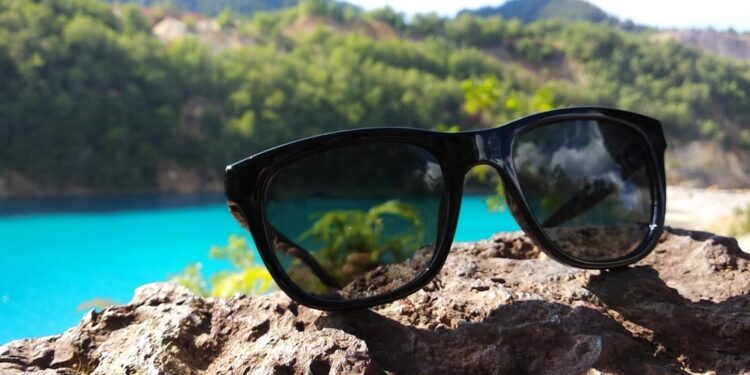Sunlight reflects off smooth surfaces like the water or a car hood, creating glare that can strain your eyes. Polarized sunglasses use a special chemical filter to only allow vertical light waves through and absorb all horizontal ones.
The result is less glare and more comfort, which is excellent news for people doing activities like fishing, boating, driving, skiing, or even going to the beach.
Table of Contents
Reduces Glare
Like your biceps and glutes, your eyes work hard, especially when exposed to bright sunlight. Sunlight reflecting off flat surfaces like sand, snow, and asphalt roads creates an annoying, unrelenting glare that’s distracting and can have long-term eye health impacts such as cataracts.
Sun’s out, shades on, but still struggling with glare? Regular sunglasses dim the world, but the answer lies in what are polarized sunglasses. These game-changers have a built-in filter that acts like a shield against a specific kind of light – the horizontally polarized kind, like those annoying water ripples that make your eyes work overtime. Polarized lenses only let the vertical waves pass through, meaning less glare, clearer vision, and maximum sun-loving comfort. So, upgrade your shades and experience the difference for yourself!
You can tell your sunglasses are polarized by holding them to the light and looking at the reflection. The lenses should block out all the horizontal glare while still allowing in natural light, which is how you can test your sunglasses’ polarization before buying them. Polarized lenses are perfect for sports that require precision and clear vision, like fishing, skiing, and water-based activities.
Reduces Eye Strain
Polarized sunglasses significantly reduce glare that can make your eyes feel tired or uncomfortable, particularly in bright environments. These lenses also improve vision clarity in bright conditions, helping you see more detail outdoors or using a computer or other electronic devices.
The polarizing filters in these lenses create openings for light that only allow vertically approaching rays through. This helps to eliminate the horizontal light waves that bounce off surfaces like smooth water, chrome car hoods, or snow, reducing eye strain.
However, it is essential to note that polarized sunglasses can reduce the available light and make particular objects appear darker than they are. This can be problematic when skiing, making it harder to identify icy patches in the snow. Additionally, polarized lenses don’t work well with liquid crystal display screens, such as those found on cell phones and other handheld devices. If you are concerned about the impact of polarized sunglasses on these types of devices, ask your optometrist to recommend an alternative.
Reduces UV Rays
Sunlight contains UV rays that can damage the eye, just like sunlight damages skin. Excessive exposure to UV rays has been linked to cataracts, glaucoma, and age-related macular degeneration. Fortunately, polarized sunglasses filter out UV rays, protecting the eyes from potential damage.
While unpolarized sunglasses reduce glare by darkening the light, they don’t block UV rays. To see if a pair of sunglasses is polarized, tilt one lens and look at a bright horizontal surface such as water. If the light intensity increases, then the lenses are polarized.
Polarized sunglasses filter out horizontally reflected light waves and allow vertical waves through, cutting glare from things like water or snow. This reduces eye strain and enhances visibility. Polarized sunglasses are great for activities that involve looking at reflective surfaces, such as driving, boating, water skiing, and snow sports. They also provide clear vision when looking at a flat surface such as a road or a white snowy mountain.
Increases Visibility
Unlike most sunglasses that darken light entering your eyes, polarized lenses filter out horizontal light waves. This allows for clearer vision and better contrasts. Blocking horizontal light may also make liquid crystal displays (LCDs) and other digital interfaces look slightly fuzzy. Still, the overall result is a much more comfortable experience in variable lighting conditions.
Sunglasses with polarized lenses are great for water activities and sports, where glare can occur from sunlight reflecting off the surface of water or snow. They’re ideal for fishing, skiing, sailing, and boating. They reduce glare that can cause eye strain and distract you from the task, helping you enjoy these outdoor sports more comfortably. They also allow you to see the reflections of the water beneath the surface, providing a more accurate fishing experience.


 Home
Home









